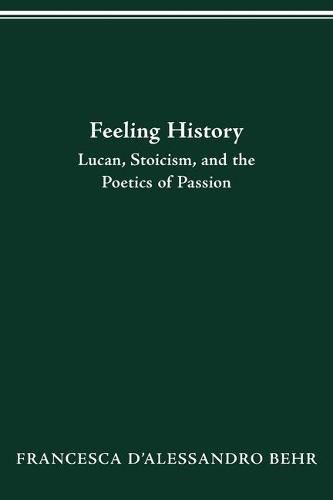Readings Newsletter
Become a Readings Member to make your shopping experience even easier.
Sign in or sign up for free!
You’re not far away from qualifying for FREE standard shipping within Australia
You’ve qualified for FREE standard shipping within Australia
The cart is loading…






This title is printed to order. This book may have been self-published. If so, we cannot guarantee the quality of the content. In the main most books will have gone through the editing process however some may not. We therefore suggest that you be aware of this before ordering this book. If in doubt check either the author or publisher’s details as we are unable to accept any returns unless they are faulty. Please contact us if you have any questions.
Feeling History is a study of apostrophe (i.e., the rhetorical device in which the narrator talks directly to his characters) in Lucan’s Bellum Civile. Through the narrator’s direct addresses, irony, and grotesque imagery, Lucan appears not as a nihilist, but as a character deeply concerned about ethics. The purpose of this book is to demonstrate how Lucan’s style represents a criticism of the Roman approach to history, epic, ethics, and aesthetics. The book’s chief interest lies in the ethical and moral stance that the poet-narrator takes toward his characters and his audience. To this end, Francesca D'Alessandro Behr studies the ways in which the narrator communicates ethical and moral judgments. Lucan’s retelling of this central historical epic triggers in the mind of the reader questions about the validity of the Roman imperial project as a whole.
An analysis of selected apostrophes from the Bellum Civile allows us to confront issues that are behind Lucan’s disquieting imagery: how can we square the poet’s Stoic perspectives with his poetically conveyed emotional urgency? Lucan’s approach seems inspired by Aristotle, especially his Poetics, as much as by Stoic philosophy. In Lucan’s aesthetic project, participation and alienation work as phases through which the narrator leads the reader to a desired understanding of his work of art. At the same time, the reader is confronted with the ends and limits of the aesthetic enterprise in general.
Lucan’s long-acknowledged political engagement must therefore be connected to his philosophical and aesthetic stance. In the same way that Lucan is unable to break free from the Virgilian model, neither can he develop a defense of morality outside of the Stoic mold. His philosophy is not a crystal ball to read the future or a numbing drug imposing acceptance. The philosophical vision that Lucan finds intellectually and aesthetically compelling does not insulate his characters (and readers) from suffering, nor does it excuse them from wrongdoing. Rather, it obligates them to confront the responsibilities and limits of acting morally in a chaotic world.
$9.00 standard shipping within Australia
FREE standard shipping within Australia for orders over $100.00
Express & International shipping calculated at checkout
This title is printed to order. This book may have been self-published. If so, we cannot guarantee the quality of the content. In the main most books will have gone through the editing process however some may not. We therefore suggest that you be aware of this before ordering this book. If in doubt check either the author or publisher’s details as we are unable to accept any returns unless they are faulty. Please contact us if you have any questions.
Feeling History is a study of apostrophe (i.e., the rhetorical device in which the narrator talks directly to his characters) in Lucan’s Bellum Civile. Through the narrator’s direct addresses, irony, and grotesque imagery, Lucan appears not as a nihilist, but as a character deeply concerned about ethics. The purpose of this book is to demonstrate how Lucan’s style represents a criticism of the Roman approach to history, epic, ethics, and aesthetics. The book’s chief interest lies in the ethical and moral stance that the poet-narrator takes toward his characters and his audience. To this end, Francesca D'Alessandro Behr studies the ways in which the narrator communicates ethical and moral judgments. Lucan’s retelling of this central historical epic triggers in the mind of the reader questions about the validity of the Roman imperial project as a whole.
An analysis of selected apostrophes from the Bellum Civile allows us to confront issues that are behind Lucan’s disquieting imagery: how can we square the poet’s Stoic perspectives with his poetically conveyed emotional urgency? Lucan’s approach seems inspired by Aristotle, especially his Poetics, as much as by Stoic philosophy. In Lucan’s aesthetic project, participation and alienation work as phases through which the narrator leads the reader to a desired understanding of his work of art. At the same time, the reader is confronted with the ends and limits of the aesthetic enterprise in general.
Lucan’s long-acknowledged political engagement must therefore be connected to his philosophical and aesthetic stance. In the same way that Lucan is unable to break free from the Virgilian model, neither can he develop a defense of morality outside of the Stoic mold. His philosophy is not a crystal ball to read the future or a numbing drug imposing acceptance. The philosophical vision that Lucan finds intellectually and aesthetically compelling does not insulate his characters (and readers) from suffering, nor does it excuse them from wrongdoing. Rather, it obligates them to confront the responsibilities and limits of acting morally in a chaotic world.